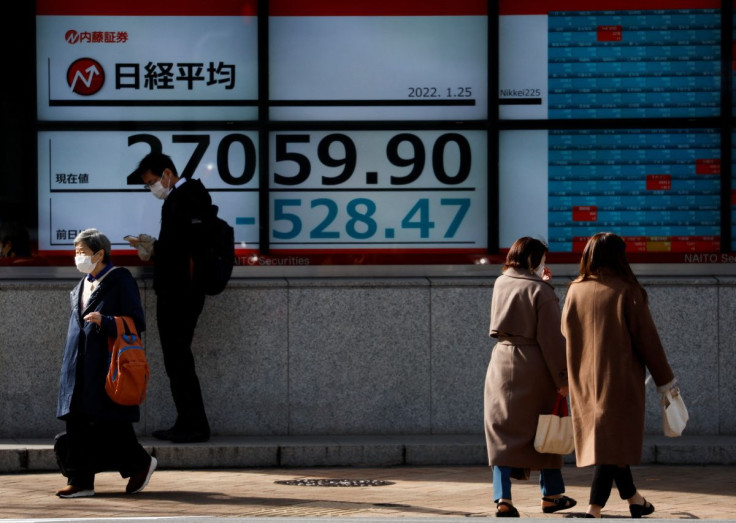Wall Street Drops, European Shares See First Weekly Gain Of 2022

Wall Street tumbled in choppy trade on Friday, European shares finished lower but still eked out their first weekly gain of the year as traders grappled with decades-high inflation and the prospect of a tightened rate hike timeline from the U.S. Federal Reserve.
Benchmark Treasury yields lost ground, and German bond yields backed off the 2018 highs struck on Thursday. Gold prices were on track for their biggest weekly gain in 3 months amid the inflation worries.
Rising oil prices boosted energy shares more than 2%, even as the major U.S. stock indexes retreated from earlier gains.
The Dow Jones Industrial Average fell 341.15 points, or 0.97%, to 34,900.44, the S&P 500 lost 64.39 points, or 1.43%, to 4,439.69 and the Nasdaq Composite dropped 311.99 points, or 2.2%, to 13,873.65 by 2:15 p.m. EST (1915 GMT).
"The market is trying to figure out direction and who the new winners are going to be," said Sean O'Hara, president at Pacer ETFs.
"For the last several years, it's basically been five stocks that have driven all the returns and some of those names are coming under pressure now."
On Thursday, a report from the Labor Department showed U.S. inflation at its hottest level in four decades, fueling concerns that the Fed could begin hiking key interest rates more aggressively than many anticipated.
Those concerns were heightened after St. Louis Federal Reserve President James Bullard told Bloomberg he wants a full percentage point of interest rate hikes over the next three central bank policy meetings.
Financial markets are fully pricing in a rate hike of at least 25 basis points from the Fed at its March 15-16 policy meeting and are forecasting a 71.5% chance of a 50-basis-point hike, according to CME Group's FedWatch Tool.
"We really won't know what the Fed is going to do until it happens," said Tim Ghriskey, senior portfolio strategist at Ingalls & Snyder in New York. "There's a lot more data between now and the next Fed meeting for them to access."
"There's little chance the Fed will not act, but I continue to believe we'll see signs of moderating inflation between now and the Fed meeting and a 25 basis point hike is the more likely move," Ghriskey added.
Interest rate sensitive tech shares weighed on European stocks as high U.S. inflation raised the odds of a more aggressive Fed.
The pan-European STOXX 600 index closed 0.6% lower, but added 1.6% this week, its best since late-December.
MSCI's gauge of stocks across the globe shed 1.4%.
Emerging markets stocks fell 0.94%. MSCI's broadest index of Asia-Pacific shares outside Japan closed 0.73% lower, while Japan's Nikkei rose 0.42%.
U.S. Treasury yields eased on Friday, as markets assessed a sharp move higher the previous day driven by inflation and Bullard's commentary.
Treasuries Benchmark 10-year notes last rose to yield 1.9649%, while the 30-year bond last increased to yield 2.2782%.
The 2-year note last rose to yield 1.5141%, from 1.56%.
The dollar index rose 0.233%, with the euro down 0.74% to $1.1342, on course for weekly gains following the CPI data and worries over aggressive Fed tightening.
The Japanese yen strengthened 0.70% versus the greenback at 115.20 per dollar, while sterling was last trading at $1.3558, up 0.02% on the day.
But the euro weakened, down 0.79%, following a warning from European Central Bank President Christine Lagarde that raising interest rates would only hurt the economy.
Crude prices advanced after the International Energy Agency (IEA) said oil markets were tight, exacerbating supply concerns as Russian massed more troops along the Ukrainian border and diplomats scrambled to avoid an invasion.
Brent crude futures rose $3.83, to $95.24 a barrel. U.S. crude futures gained $4.49, to $94.37 a barrel.
Spot gold prices rose $33.0799 or 1.81%, to $1,859.65 an ounce.
© Copyright Thomson Reuters 2024. All rights reserved.




















